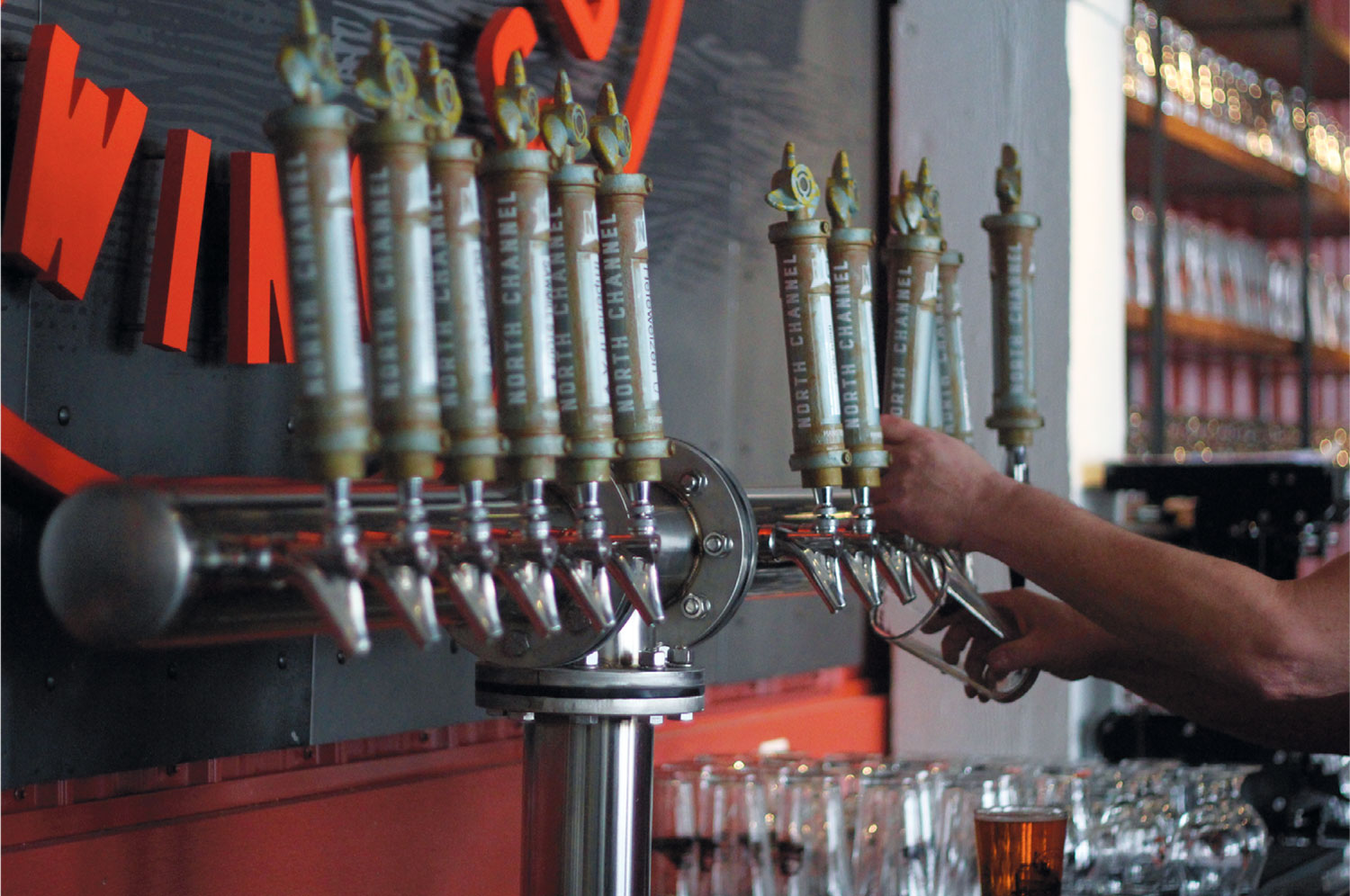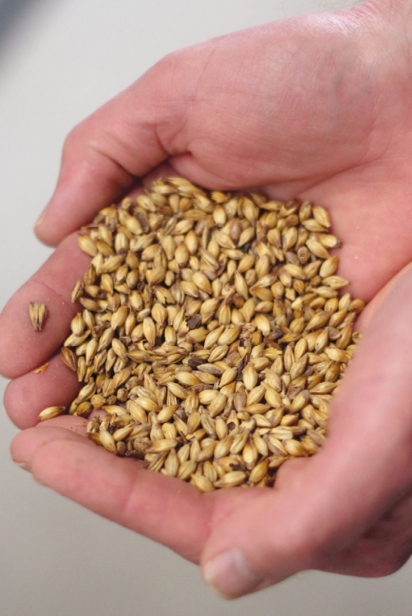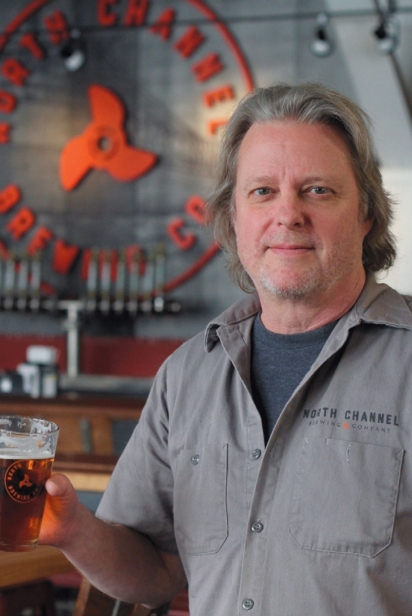Transformation on Tap
Just like the ripple effect of pebbles being thrown into a lake, the microbrewery scene in Northern Michigan is spreading into rural communities and changing the flow of life in the small towns it touches.
Twenty years ago, Traverse City touted just two brewpubs, and they opened only about a month apart in 1997: Mackinaw Brewing Company first, then North Peak Brewing Company not long after. Since that time, multiple microbreweries have popped up in the town and are still in operation: Right Brain Brewery opened in 2007 in the Warehouse District and moved to their larger facility in 2012; Jolly Pumpkin in 2010; CraftHouse TC and The Filling Station in 2012; The Workshop and Brewery Terra Firma in 2013; Rare Bird in 2014; Earthen Ales at the end of 2016; and Monkey Fist, most recently, in June 2017.
That’s in Traverse City. Meanwhile, in the less-urban surrounding areas, breweries are shaping small downtown districts. For instance, Short’s Brewing Company opened in downtown Bellaire in 2004 and expanded into an Elk Rapids–based bottling/operations plant in 2009, creating jobs in both towns and a “third place” for people to go in Bellaire. Likewise, Stormcloud Brewing Company changed the fabric of downtown Frankfort when it opened in 2013, and again when it recently expanded into a bottling plant just down the road, creating five new jobs, on top of the 60 already at peak summer season.
From Petoskey, Boyne Falls and Charlevoix to Lake Ann, Suttons Bay, Northport and beyond, small towns in the ten-county region have grown new brewpubs at a pace that is hard not to notice. Many of these breweries opened during the 2010s, which is reflective of trends in the Great Lakes State and across the nation in general. According to Scott Graham, executive director of the Michigan Brewers Guild, there were around 75 microbreweries in the entire state of Michigan a decade ago. But now, there are more than 6,000 breweries nationwide and more than 300 in Michigan, with close to 40 in the northern Lower Peninsula. Graham attributes the growth to increasing awareness and subsequent increased demand.
“There are more breweries now in our state and in our country than there have been in any other time in history,” Graham says.
Well, another new attraction opened up in November, this one in downtown Manistee: North Channel Brewing Company, located across the Manistee River from the downtown area and next to the drawbridge. The brewery is the brainchild of Ron and Dawn Ford of Grand Rapids, and many in the community are hoping that it will breathe some new life into downtown Manistee, just as other Northern Michigan breweries have done for their small towns.
There are many reasons that locals are getting excited, and it is not just about the beer. The Texas-style food is different than anything else around; the brewery will feature live entertainment several nights of the week; and the project has rehabilitated a 100-year-old building in a derelict part of town. Additionally, 14 new housing units will soon be available above the brewery in the same building.
Jobs, homes and beer, oh my!
WHY MANISTEE?
The Fords first came to Manistee in 2002, when they were driving the Lake Michigan coastline in search of a “summer place.” At the time, Manistee had Lighthouse Brewing, a microbrewery on River Street, that had been open since 1998. Its capacity was, according to Ron Ford, larger than many other breweries in the state back then, and Lighthouse was distributing to local and regional markets in bottles.
Notably, the Fords considered a local brewery a perk of choosing to vacation in Manistee. But Lighthouse Brewing closed later the same year that the Fords visited, in October 2002.
Fast-forward to 2012, when Lighthouse Brewing had been closed for a decade and the town was suffering the effects of the housing bust and the Great Recession. However, over this same decade, the craft-brewery scene had exploded.
Ron Ford and his son had been home-brewing for about two years and they thought that Manistee was the perfect place to open a craft brewery since, at the time, there were no breweries between Ludington and Traverse City. Then Stormcloud opened in June 2013 in Frankfort and was very successful, so the idea for a Manistee brewery continued to gather momentum in the Ford household. With a 29-page business plan, they secured partners: Aaron and Erik May (brothers) and Phil Johnson.
The concept for the brewery was—and still is—to mix creativity and science. They wanted to produce high-quality beverages and gastro-pub food at a reasonable price, using as many locally sourced ingredients as possible.
So far, the reception has been very, very good.
“Our winter has went well,” Ron Ford says. “We have developed a great local following in the restaurant and brewery, and we have seen some ‘beer tourist’ activity. We had a number of special events, including a beer-tasting dinner, pairing beers and specialty foods; our Low Country boil events included fish, crabs, shrimp and lobster in our boil; comedy nights; and the release of a new beer varietal monthly.”
The plans for summer include outdoor seating for 40 to 50 people, plus the unveiling of a new and expanded menu, which will include additional gluten-free and vegetarian choices, along with their popular Texas-style barbecue. The monthly beer release will continue, with beers that are “summer friendly.”
A DOZEN TAPS
Bill Joslyn is the head brewer, and there are 12 taps that are made on-site. There are also two ciders on tap: a blueberry cider and a rotating tap, which is currently cherry cider. In the summer, the plan is to expand to even more cider choices. Jacob Walsh, the taproom manager, says that they will also be selling liquor shortly, with creative craft cocktails.
Joslyn moved back to Northern Michigan from North Carolina specifically for the position with North Channel Brewing Company. He began home-brewing in 1990, when he was living in Northern Michigan and working as an artist. In 2000, he was accepted into the Master Brewers Program at the University of California, Davis, and later that year, he began working at Boulder Beer in Boulder, Colorado. By 2003, Joslyn had moved to The Saint Louis Brewery (Schafly Brand) in St. Louis, Missouri; he later spent a few years at Oskar Blues Brewery in Longmont, Colorado, and in Brevard, North Carolina.
In April, the brewery released a collaboration beer of the Maibock variety, brewed with Cedar Springs Brewing, located about 110 miles southeast of Manistee, just outside Grand Rapids.
“Their brewer and ours, Bill Joslyn, worked together earlier in their careers out at a brewery in St. Louis, and they’ve been friends for years,” Ford says.
Every beer on the menu lists what percentage of malt and hops are Michigan-sourced ingredients. (See sidebar.)
“We use Michigan-sourced hops for a host of reasons,” Erik May explains. “Logistics are easier; the Michigan-grown hops have their own terroir, compared to Pacific Northwest or the international hops. We use Michigan-sourced materials wherever we can to impart uniqueness to our beers and also, certainly, to add some to the story. Personally, I am a big fan of Michigan Chinook hops over Pacific Northwest Chinook—in my opinion, they’ve got a more pronounced flavor and aroma, more spiciness. It’s not that hops from anywhere else aren’t as ‘good’ or anything, just that the Michigan-grown ones are just inherently different, and we want to support that difference, because it makes us unique and makes our beer unique. And we obviously want to support those that live and work in our communities, the ones that support us.”
LOCAL INGREDIENTS
Using local ingredients—and showcasing them on the menu—is something that many local breweries are doing, in large part just because they now are able to do so. A decade ago, that meant mostly fruits, berries, herbs, spices and sugar sources like honey or maple syrup. Whereas these items are used in relatively small quantities for beer making, ingredients like local hops and malted barley can make up a much larger percentage of the total ingredients. (Not to mention the locally sourced water, says Scott Graham of the Michigan Brewers Guild, which is by far the biggest ingredient in beer.)
“Ten years ago, there weren’t any local hops or malts, or at least there were very little,” Graham says. “You could get malt from Michigan Malt, probably, but in small quantities. It was about ten years ago that a few people started planting hops in Michigan, and that has grown substantially. And as availability has grown, so has the quality and the selection.”
Michigan is now the fourth-largest hop-producing state in the country. Meanwhile, the production of local malted barley is a resurgence from 30 years ago.
“This was going on in the 1980s for larger breweries at a larger capacity, but it ended in the 1980s, when Stroh’s Brewery closed operations in Detroit,” Graham says. He estimates that there are currently around 12 Michigan companies and quite a number of local farmers who are growing barley for malting. “It’s not at the stage that Michigan-produced hops are at yet, but the industry is definitely growing and gaining interest, thanks in large part to the educational support of the MSU Extension, which has made information available and has provided guidance to farmers for both hops and malted barley.”
Graham mentions that there is also a yeast lab in Michigan that has isolated a native yeast strain and propagates this for local breweries to use.
SOUTHERN-INSPIRED FOOD
As for the food side of things, Carl Eskridge is the general manager and executive chef. His idea was to serve Texas-style barbecue and Southern-inspired cuisine. For instance, they have alligator bites on the menu all the time, and sometimes rattlesnake. They have fried pickles, Southwestern shrimp, jalapeno cornbread and pork carnitas tacos. The restaurant is currently going through 40 briskets per week, in addition to the baby back ribs and chopped barbecue pork that comes out of the smoker.
Bobby Elkins is the sous chef. He is originally from Fort Wayne, Indiana, but has lived in Manistee for quite a while now; he worked for seven years at Manistee’s Little River Casino and two years before that at Battle Creek’s Firekeepers Casino, which Elkins says is a completely from-scratch kitchen. This was good preparation, he says, since 98 percent of what comes out of the North Channel kitchen is made from scratch, too—the potato chips, the tortilla chips, the sauces, the dressings, almost everything.
Elkins says that Eskridge wrote the menu, and Elkins helped to tweak it.
Since opening last November, every benchmark that they have set so far has been surpassed, Elkins says, and so their benchmarks are going up every week, as their food has been in high demand. And there is no wondering why—it is good. And it is different from what most others in the area are serving.
“There are a couple of places nearby, like Ludington, that are doing Memphis-style barbecue,” Elkins says. “But we are doing Texas- or Louisiana-style, with a heavy dry rub. I call it ‘mop barbecue sauce,’ because it’s thin. And coffee is the main ingredient.”
When you go, make sure to order the Bacon Slaw Burger, which comes with homemade bacon jam, creamy Southern coleslaw, crispy-fried shaved onion and white cheddar, served on a brioche bun with lettuce, tomato and onion. Just make sure to grab a napkin or two, as the huge, super-tasty treat takes two hands to grip and oozes with each bite.
Seriously: The bacon jam is delightful—to make one quart, it takes two pounds of bacon, seven jalapenos and one red pepper. But the result is “all sweet, no heat,” Elkins says. (The jam has been so popular that they are thinking of bottling and selling it.)
OLD BUILDING GETS NEW LIFE
North Channel Brewing Company is located in a 21,000-squarefoot, three-story, 100-year-old building that sits on just over half an acre. The building was once Manistee Manufacturing, a furniture company that began in the 1890s. At one time, the building encompassed the whole block, according to the brewery’s website, but several large fires eventually led to the company’s shuttering. The building has had several uses since—all manufacturing through the early 2000s, though it was most recently used as a resale store until 2010. Then the dilapidated building sat vacant for many years.
The structure was in worse shape than the business partners originally thought, so it took eight months of construction to get the brewery ready. The brewpub can hold about 150 people at capacity—about 75 in the front room with the bar and a dozen tables, and another 75 or so in the back room that is filled mainly with booths.
But there are further plans for the building: The brewery and restaurant are located in 8,000 square feet on the first floor, and there are 13,000 square feet comprising 14 apartments upstairs, planned to open this summer. Confidence in the project’s success at bringing needed jobs and commerce is displayed in the sources of funding, which include an award for close to $1 million from the Michigan Community Revitalization Program, a loan from local Shelby State Bank, historic tax credits and the City of Manistee itself.
Currently no other restaurants are serving North Channel’s beer on tap, although co-owner Ford says that they hope to begin distributing by summer. So for now anyway, the best way to enjoy the full selection of North Channel beer is at the brewpub itself. Stop in for lunch after shopping at the farmers’ market, located right across the street from the brewery. Take a stroll along the Manistee River after grabbing a pint with a friend. Or maybe, instead of waiting in a line of cars for a ship to pass under the drawbridge, take a breather, park on the street and head inside for a bite and a brew.
IF YOU GO:
North Channel Brewing Company
86 Washington St., Manistee
231-299-1020 NorthChannelBrewing.com
North Channel Brew Menu
North Channel brewer Bill Joslyn is mixing up a variety of classic beer styles made with local ingredients—and naming them after Manistee landmarks and history that locals would understand. Of the ten beers currently on tap, all use a high percentage of Michigan-grown hops, and many also feature Michigan malts. Here’s a sample flight!
Salt City Blonde (5.9% ABV, 26 IBU, 20% Michigan malt): Designed to be a balanced beer with a simple grain bill—2-row barley along with Pilot Malt House malted white wheat and malted oats.
The Vogue Dubbel (8.7% ABV, 25 IBU, 80% Michigan malt): Named in honor of the historic Vogue Theater in downtown Manistee and celebrating the theater’s 80th birthday in January 2018. A balanced Belgian Dubbel with a hint of cherry to help sweeten just a bit.
North Country Hefe (5.2% ABV, 26 IBU, 69% Michigan malt): Traditional Hefeweizen style, brewed with Pilsner malt and malted white wheat as well as a small amount of North American 2-row barley, and hopped with Mandarina and Saaz.
Gale Force Imperial IPA (9.9% ABV, 89 IBU, 38% Michigan malt): Heavily hopped with Michigan Cascade and Michigan Chinook hops (both from Top Hops in Goodrich, Michigan), along with a hefty grain bill and 35 pounds of locally sourced Michigan honey makes for a smooth, high-octane Imperial IPA.
Magnetic Sand Black IPA (6.5% ABV, 60 IBU, 27% Michigan malt): Pays homage to the beautiful black “vein” of magnetite occasionally seen on the local beaches. Malt from Pilot Malt House, as well as European and other North American malts form the backbone, while 100% Michigan hops create the aroma and bitterness.







